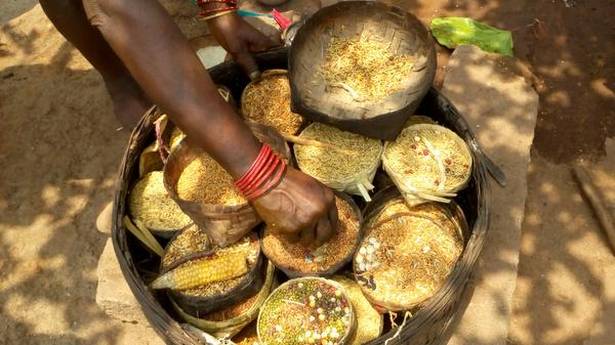The Forest Department has provided guidance to four tribal settlements in Coimbatore Forest Division and has shown the way for the tribal population to successfully take to agriculture.
Divisional Forest Officer V. Thirunavukkarasu said as part of the initiative to economically and socially uplift the living conditions of the tribal people, the department has joined hands with Avanashilingam Jan Shikshan Sansthan to guide the tribal people into a new activity for earning their livelihood.
The empowerment of the tribal people was to turn them into guardians of the forests and wean them away from the plunderers of forest wealth. […]
Generators
Mr. Thirunavukkarasu said that besides providing the logistics such as pumpsets and generators, the department was also extending loans from the Eco-Development Committee funds (earned by the tribal people through eco-tourism initiatives).
In tribal settlements, cultivable areas have been earmarked and provided with solar electric fencing. Three tribal settlements near Pilloor dam in Karamadai range have been successful for the last two years in harvesting bananas, pumpkins and cow beans.
The tribal people cultivated only crops such as ragi, horse gram and Val Beans ( mochai). Earlier, they were cultivating paddy that was not economically viable. […]
Mr. Balasubramanian said that tribal people were very active and in fact spent most of their time at their farms […]
M.S. Parthiban, Pooluvampatti Range Officer, said that the tribal people were just guided in selection of crops. […]
Source: “”Agriculture, now mainstay of Coimbatore’s tribal people”” by V.S. Palaniappan, The Hindu, 24 February 2011
Address : http://www.thehindu.com/todays-paper/tp-national/tp-tamilnadu/article1485223.ece?textsize=small&test=2
Date Visited: Wed Sep 21 2011 09:38:20 GMT+0200 (CEST)
Up-to-date reports by Indian experts and journalists
Search tips
Combine the name of any particular state, language or region with that of any tribal (Adivasi) community.
Add keywords of special interest (music, poetry, dance just as health, sacred grove and biodiversity); learn about the rights of Scheduled Tribes such as the “Forest Rights Act” (FRA); and the United Nations “Declaration on the Rights of Indigenous Peoples”, “Universal Declaration of Human Rights”, “women’s rights”, or “children’s right to education”.
Specify any other issue or news item you want to learn more about (biodiversity, bonded labour and human trafficking, climate change, ecology, economic development, ethnobotany, ethnomedicine, global warming, hunter-gatherers in a particular region or state, prevention of rural poverty, water access).
For official figures include “scheduled tribe ST” along with a union state or region: e.g. “Chhattisgarh ST community”, “Himalayan tribe”, “Scheduled tribe Tamil Nadu census”, “ST Kerala census”, “Particularly Vulnerable Tribal Group Jharkhand”, “PVTG Rajasthan”, “Adivasi ST Kerala”, “Adibasi ST West Bengal” etc.
In case the Google Custom Search window is not displayed here try the following: (1) toggle between “Reader” and regular viewing; (2) in your browser’s Security settings select “Enable JavaScript” | More tips >>
Note: hyperlinks and quotes are meant for fact-checking and information purposes only | Disclaimer >>
List of websites covered by this Google custom search engine
Academia.edu (platform for academics to share research papers) – www.academia.edu
Archive.org – https://archive.org
Centre for Science and Environment – https://www.cseindia.org
Current Conservation – https://www.currentconservation.org
Development and Cooperation (D+C) https://www.dandc.eu
Down To Earth (India) – www.downtoearth.org.in
India Environment Portal – www.indiaenvironmentportal.org.in
Harnessing Nature Magazine – https://harnessingnature.online
Mongabay-India – https://india.mongabay.com
M S Swaminathan Research Foundation – www.mssrf.org
Navdanya (protecting India’s biodiversity based food heritage) – https://navdanya.org
Third World Network (Penang, Malaysia) – https://twn.my
The Shola Trust (nature conservation in the Nilgiri region) – www.thesholatrust.org
WorldCat (“the world’s largest library catalog, helping you find library materials online”) – https://worldcat.org
Research the above issues with the help of Shodhganga: A reservoir of theses from universities all over India, made available under Open Access >>
Note: hyperlinks and quotes are meant for fact-checking and information purposes only | Disclaimer >>

Photo © The Hindu >>
Health & nutrition | Revival of traditions >>